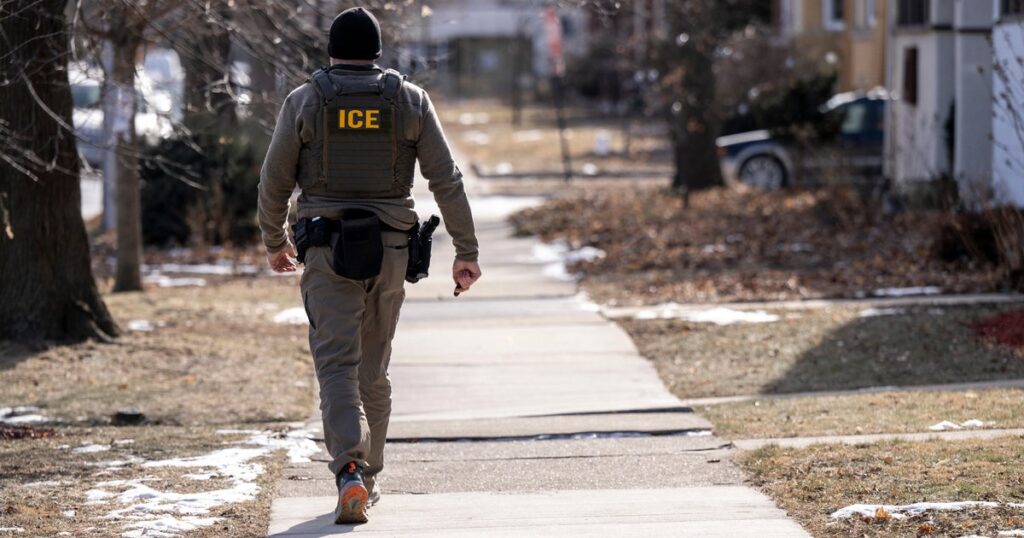In his first few months of office, President Donald Trump has targeted immigrants with tattoos and foreign university students with green cards or visas for deportation ― and a recent alarming case is raising concerns that U.S. citizens could be next.
Last Wednesday, Juan Carlos Lopez-Gomez, a Georgia-born U.S. citizen, was arrested in Florida and charged with illegally entering the state as an “unauthorized alien.”
Even though a judge later said Lopez-Gomez’s birth certificate was “authentic” and there was no probable cause for his charge, he was still put on an ICE detainer, as the Florida Phoenix first reported.
An ICE detainer is when U.S. Immigration and Customs Enforcement gets local authorities to agree to hold a person in jail for up to 48 hours beyond the time they would ordinarily be released so that ICE can pick them up and place them in immigration detention.
Lopez-Gomez’s case sparked protest, and he was released last Thursday. He maintains that he told a state trooper he was a U.S. citizen and had shared his Georgia ID and Social Security card ― but the Department of Homeland Security denies this, claiming that Lopez-Gomez had told a Florida Highway Patrol trooper that he was in the country illegally.
“Immediately after learning the individual was a United States citizen, [Lopez-Gomez] was released,” a DHS senior official told the Florida Phoenix in a statement.
HuffPost reached out to ICE about Lopez-Gomez’s case and what would necessitate ICE to investigate a U.S. citizen.
Bloomberg via Getty Images
Lopez-Gomez’s case and others like it, along with rising anti-immigrant sentiment in general, are raising concerns about whether U.S. citizens need to be carrying proof of their citizenship while they drive or go to bars with friends ― and if that is even helpful or necessary.
HuffPost talked with immigration experts about what people should know.
“The law is divorced from reality.”
Legal noncitizen immigrants like green card-holders are already required to keep their immigration papers with them at all times, but U.S. citizens aren’t obligated to carry proof of their citizenship.
In an ideal world, U.S. citizens wouldn’t be questioned about whether or not they are authorized to be in the U.S., but it happens.
In 2020, the American Civil Liberties Union settled a case with U.S. Customs and Border Protection over two U.S. citizens in Montana who were detained for “speaking Spanish in the store in a state where it’s predominantly English speaking,” according to the agent who detained them.
“If somebody were to be picked up by ICE who’s a US citizen, they have a very strong civil rights suit because of the racial profiling involved and the detention that would be involved,” said Saira Hussain, a senior staff attorney at the Electronic Frontier Foundation, a digital rights organization.
But under this political climate, it’s understandable why you might want to carry proof of U.S. citizenship ― particularly if you fear being a target of the Trump administration.
“The bigger problem, I think that all of us should be concerned about, is ‘Why are we looking over our shoulder?’”
– Jennifer Ibañez Whitlock, senior policy counsel for the National Immigration Law Center
Jennifer Ibañez Whitlock, senior policy counsel for the National Immigration Law Center, said it’s a “100% valid” concern for U.S. citizens to be afraid of being detained by ICE.
She noted that people who “don’t appear American” ― a broad, subjective category reliant on stereotypes and misconceptions about who can be an American ― are the most at risk of being targeted by immigration authorities.
With the immigrant populations she works with, “There’s a sense of that you need to have [documentation] on you, just in case, no matter how long you lived here, and even if you’re a naturalized citizen if you speak with an accent,” or have a last name someone may assume is Latin American, Whitlock said. In these cases, there is a belief “you may need to have that on your person to avoid being taken into custody.”
“The bigger problem, I think that all of us should be concerned about, is ‘Why are we looking over our shoulder?’” Whitlock continued. “And the answer is because we have an executive that thinks that they can be judge, jury, executioner. So if they think that you don’t belong here, they think they should they have the right to arrest you,” referring to Trump’s mass deportation plans.
Hussain said that U.S. citizens are not legally required to carry documentation, but added, “The law is divorced from reality.”
Hussain used herself as an example. On a recent trip to San Diego, California, which is near a U.S. border, she and her husband both brought their U.S. passports. She did this in case she was stopped by Border Patrol and needed to show evidence of U.S. citizenship.
“That isn’t something that should have to happen, because the case law is very clear about that,” Hussain said. “But the practical reality on the ground is that it seems like the Department of Homeland Security and all of their subcomponents, like ICE and CBP [Customs and Border Protection] may not necessarily be following case law at the moment.”
Carrying copies of your IDs and citizenship documentation can be helpful.
Whitlock said she would not recommend walking around with original documents like your naturalization or birth certificate. However, she said that “having a scanned copy of your documents is a good idea so that you can easily pull it up on your phone.“
Immigration attorney David Nachman also said that carrying proof of citizenship is not necessary for a U.S. citizen and is a “personal choice.” At the same time, he has clients who are U.S. citizens and do carry documentation with them to work, because they work in places that Homeland Security investigations often target, like warehouses and restaurants, he said.
Nachman shared the example of one hospitality worker who keeps a laminated copy of his naturalization certificate in his wallet because he does not want to be erroneously swept up in an ICE raid.
Keeping copies like this on your person “at least raises a presumption” of your citizenship, Nachman said, noting that he finds it “sad and depressing” to state that carrying documentation is “not a bad idea” for some U.S. citizens because the message being communicated is “Hey, our government is going to stereotype.”
But carrying proof of citizenship is not a foolproof solution, either.
Your U.S. passport, passport card, birth certificate or naturalization certificate can be strong evidence of your U.S. citizenship ― but the reality is that many Americans may not have all of these documents readily available, either.
Only half of Americans have a valid passport, according to the Center for American Progress policy institute.
Even having IDs in your pocket may not be a foolproof solution to unwanted questioning from immigration authorities. Lopez-Gomez’s case is not the first time ICE has detained a U.S. citizen this year. In January, a U.S. citizen ― who had his identification in his wallet ― was reportedly detained by ICE in Chicago for 10 hours before being released.
Additionally, in April, a 19-year-old U.S. citizen was detained by Border Patrol agents in Arizona for 10 days; DHS claims the teen said he had entered the country illegally from Mexico. The charges were dismissed after his family presented documents showing his U.S. citizenship.
In the case of Lopez-Gomez and the Chicago-area man, they both had access to their IDs when they were detained, “a reminder that legal rights can be asserted, but are often retrospective and may not provide full protection in the moment if law enforcement is insistent on violating the law,” Hussain said.
Between 2018 and 2024, ICE reported that the agency arrested 80 U.S. citizens, 13 of them in 2024.
That number might grow under Trump’s second term. In March, ICE said in a statement that it has “made more at-large arrests in the first few weeks of President Trump’s presidency than the entire last year under the previous administration.“
And it’s not just ICE who might arrest you; it might be a local police department they partner with.
Since Trump’s reelection, the number of active “287(g) agreements,” or partnerships between ICE and local law enforcement agencies, has doubled. Under these agreements, ICE can delegate immigration enforcement duties to state and local police. Some states like California strictly limit the scope of these 287(g) agreements, while states like Florida ― where Lopez-Gomez was arrested ― have announced that every county jail will agree to comply with ICE.
“The bigger the net, the more likely [ICE is]…going to arrest people who have [legal] status, or are U.S. citizens,” Whitlock said. “And then the burden, unfortunately, is going to fall on the individual to prove that they’re here legally.”
Read the full article here








